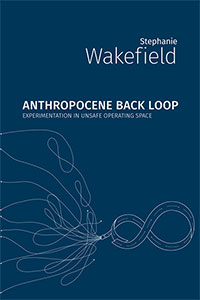Anthropocene Back Loop by Stephanie Wakefield: new from Open Humanities Press
 Monday, May 18, 2020 at 11:23AM
Monday, May 18, 2020 at 11:23AM We are delighted to announce the latest title in the Critical Climate Chaos, Irreversibility series: Stephanie Wakefield's very timely Anthropocene Back Loop: Experimentation in Unsafe Operating Space.
Like all Open Humanities Press books, Anthropocene Back Loop is available for free:
http://www.openhumanitiespress.org/books/titles/anthropocene-backloop/
 In the face of climate chaos, post-truth politics, and growing tribalisms, it’s clear that liberalism’s old structures are unraveling. Drawing on resilience ecology, Stephanie Wakefield suggests we understand such phenomena to be indicators that we are entering the Anthropocene’s back loop, a time of release and collapse, confusion and reorientation, in which not only populations and climates are being upended but also physical and metaphysical grounds. Anthropocene Back Loop takes us on a journey though different responses and manifestations of the back loop, exploring urban resilience infrastructures, post-apocalyptic imaginaries in fiction and critical theory, and a range of everyday practices from survival skills and physical fitness to experimentation with one’s soul. Rather than returning to liberalism’s safe operating space, what is needed and what can be seen in many contemporary practices, Wakefield argues, are forms of experimentation geared toward charting autonomous modes of living within the back loop’s new unsafe operating spaces. Such efforts often let go of old frameworks, hubristically experiment with new uses, cultivate an allowance for the unknown, and embrace a confidence in exploring one’s own pathways. What these iterations suggest is that the back loop, long imagined in the singular, is spiraling out into myriad trajectories. After all, if we take seriously the idea that liberalism’s single world order is unraveling, we have the opportunity - one many have long fought for - to create our own new codes, if not new worlds. Being in the back loop means that we have already crossed various tipping points, and that in doing so, everything from social practices, technologies, and truth to plants, animals, and places have become shaken out of their normal frameworks. We are free to move on new planes.
In the face of climate chaos, post-truth politics, and growing tribalisms, it’s clear that liberalism’s old structures are unraveling. Drawing on resilience ecology, Stephanie Wakefield suggests we understand such phenomena to be indicators that we are entering the Anthropocene’s back loop, a time of release and collapse, confusion and reorientation, in which not only populations and climates are being upended but also physical and metaphysical grounds. Anthropocene Back Loop takes us on a journey though different responses and manifestations of the back loop, exploring urban resilience infrastructures, post-apocalyptic imaginaries in fiction and critical theory, and a range of everyday practices from survival skills and physical fitness to experimentation with one’s soul. Rather than returning to liberalism’s safe operating space, what is needed and what can be seen in many contemporary practices, Wakefield argues, are forms of experimentation geared toward charting autonomous modes of living within the back loop’s new unsafe operating spaces. Such efforts often let go of old frameworks, hubristically experiment with new uses, cultivate an allowance for the unknown, and embrace a confidence in exploring one’s own pathways. What these iterations suggest is that the back loop, long imagined in the singular, is spiraling out into myriad trajectories. After all, if we take seriously the idea that liberalism’s single world order is unraveling, we have the opportunity - one many have long fought for - to create our own new codes, if not new worlds. Being in the back loop means that we have already crossed various tipping points, and that in doing so, everything from social practices, technologies, and truth to plants, animals, and places have become shaken out of their normal frameworks. We are free to move on new planes.
‘Announcing the apocalypse is easy. But doing something constructive with planetary catastrophe is rare and precious. Stephanie Wakefield’s repurposing of the ecological 'back loop’ for the badlands of the Anthropocene will not only fire your imagination, it will wind you up and send you out to slash, burn, pump, hammer, rivet and rewire a liveable world into existence.
- Nigel Clark – Chair of Social Sustainability, Lancaster University
Are we just survivors? Is our fate to endlessly – and aimlessly — govern the climate crisis? In this unexpected and inspiring book, Stephanie Wakefield reclaims the Anthropocene ‘back loop’ as a time for experimentation rather than fear, a time to probe possibilities rather than desperately cling to a ‘safe operating space’ that is safe only for a few. Anthropocene Back Loop returns to a key insight: Being is a question, not a blueprint. What other modes of life can we invent?
- Bruce Braun – Professor, University of Minnesota
Author Bio
Stephanie Wakefield is an urban geographer and teacher. She is currently an Urban Studies Foundation International Postdoctoral Research Fellow based at Florida International University in the Department of Global and Sociocultural Studies and Institute of Environment. She writes frequently for popular, art, and academic journals.
 Gary Hall | Comments Off |
Gary Hall | Comments Off | 





